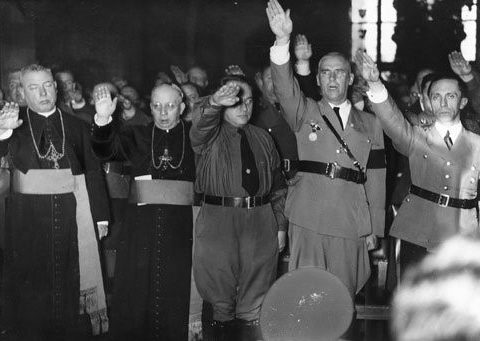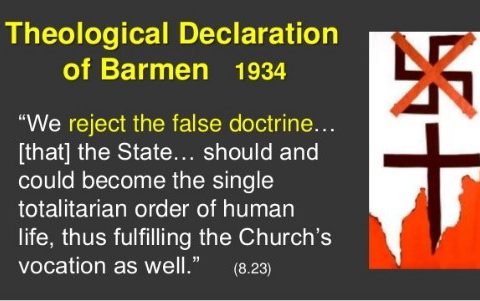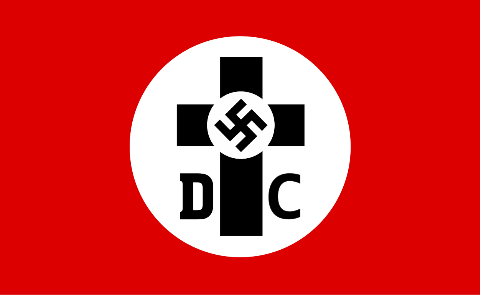A Nazi named Gerhard Kittel was the editor of the TDNT, the highly acclaimed Theological Dictionary of the New Testament. Should that mean anything? What lessons should we take away from this bizarre historical fact?
The Divide of the church in Germany
 Hitler came to power determined to rid Germany of the Jews. The evangelical church, by and large, was not aroused to the danger until 1933, when the Nazis published the Aryan Paragraph. This section of the Law for the Restoration of the Professional Civil Service stated that Jews could not hold civil service positions in German society. In 1935, the Nuremberg Laws followed. These decrees “deprived Jews of the right to citizenship and restricted relationships between ‘Aryans’ [racially pure Germans] and Jews.”
Hitler came to power determined to rid Germany of the Jews. The evangelical church, by and large, was not aroused to the danger until 1933, when the Nazis published the Aryan Paragraph. This section of the Law for the Restoration of the Professional Civil Service stated that Jews could not hold civil service positions in German society. In 1935, the Nuremberg Laws followed. These decrees “deprived Jews of the right to citizenship and restricted relationships between ‘Aryans’ [racially pure Germans] and Jews.”
In 1934, the Protestant church in Germany was ripped apart. Only the remnant (Bekennde Kirche, the Confessing Church) resisted. The majority (Deutsche Christen, the German Christians) were pro-Nazi. These “far-right” Christians subscribed to the “Aryan paragraph.” They wanted to disenfranchise and dehumanize the Jews, and remove the Old Testament from the Bible. They argued that Jesus was not a Jew in blood or culture but an Aryan.
They were Germans first and Christians second. A good Christian was first and foremost a good German. They took as their motto, “The Swastika on our breasts, the Cross in our hearts.” Many Christians who had a picture of Christ in their homes actually replaced it with a picture of Hitler, their national savior! They exchanged Mein Kampf for the Bible as their authority. There was no room for the church in the marketplace or the public square. Secular (Nazi) values were the only standards to be applied in Germany and in the German Church.
The Confessing Church, under the courageous leadership of Dietrich Bonhoeffer and Martin Niemoller, was a remnant of churches that stood against the spirit of the age, i.e. the Nazism sweeping through the Church. Their desire was not to divide the Church, but call it to return to orthodoxy.
Lawyer and pastor Erwin W. Lutzer writes in his book Hitler’s Cross, “The church had to choose between a Christ who was Lord over a shrinking ‘spiritual sphere’ and a Christ who is ‘Lord over all.’”
 The Confessing Church adopted The Barmen Declaration (Die Barmer Theologische Erklärung) in opposition to the German Christian movement. One of the key issues Barmen challenged was the prominence given by the German Christians to the government over the church, and over the consciences of Christians.
The Confessing Church adopted The Barmen Declaration (Die Barmer Theologische Erklärung) in opposition to the German Christian movement. One of the key issues Barmen challenged was the prominence given by the German Christians to the government over the church, and over the consciences of Christians.
The Confessing Church chose orthodoxy and understood that Christ was Lord of all of life, not simply a privatized, personal domain. They stood against the Nazi spirit of the age as it manifested itself in the German Church and the Third Reich. Christ was King of Kings and Lord of Lords. He is to be worshiped as such and not put under any government’s tutelage.
The German Church replaced the cross of Christ with the cross of Hitler – the swastika. Hitler had become a strong savior to  rescue Germany. He replaced the weak savior who had died on a cross. For all Christians the time of choosing had come. Only one cross could have your allegiance. Which would it be?
rescue Germany. He replaced the weak savior who had died on a cross. For all Christians the time of choosing had come. Only one cross could have your allegiance. Which would it be?
Nazi Hatred of the Jews
The Nazi hatred of the Jews may not have been so much an issue of race as it was of faith and worldview. Hitler’s core problem was the Jews’ monotheistic, moral God. Hitler railed about “the God of the deserts, that crazed, stupid, vengeful, Asiatic despot, with the power to make laws! … that poison with which both Jews and Christians have spoiled and soiled the free, wonderful instincts of man.”
The Nazis hated God. If God were God, man was not god. If God exists, He is the law maker and “autonomous”; man was not. If God is God, then man’s animal instincts must be tamed. Hitler did not want his animal instincts to be tamed. He wanted them free to run wild. Consider the results.
Hitler expressed his disdain for Christ and Christianity when he said, “The greatest blow that ever struck humanity was the coming of Christianity.”
Heinrich Himmler, the head of the Nazi Gestapo, left no ambiguity about the goal: “We shall not rest until we have rooted out Christianity.” Hitler’s plan was to eliminate the “crazed, lawmaking God of the desert” by wiping out those who worshiped and served him. First, eliminate the Jews. Then the confessing Christians. If he could kill the Jews and Christians he could rid the world of their law-giving God.
Warnings about Kittel
Perhaps as a young man Kittel had a place in his heart for the Jews and their scriptures. But in the ensuing years, he became smitten by the spirit of the Darwinian age, and its fruit, Nazism. The scholar became the theological propagandist of the Nazi movement. How could the work of such a man become a classic reference for evangelicals? How could we who consult Kittel’s work never know of his Nazi background?
Did Eerdmans, the publishing house, and Bromley, the English translator, have no idea about his background? How could they not? And if they knew, how could they have failed to give a warning?
Dr. David S. Thomason, pastor and orthodox Bible expositor, uses Kittel, but with a caveat: “It’s important to understand that the theology of TDNT is liberal; but the word studies in the TDNT are solid.”
Frederic E. Blum, Lutheran scholar, concludes, “Anyone, however, who wants to use the TDNT, and not be used by it, should be considerably well-informed as to what the theological trends and language of German New Testament scholarship have been over the last fifty years. To such a one, this Dictionary could become a great boon and multum in parvo.”
Finally, Messianic scholar Daniel Botkin writes: “Theology students are warned that this dictionary was edited by, and contains articles by Nazi theologians whose stated aim was to create a theological foundation for an anti-Jewish, ‘racially pure’ Christianity, and it should therefore be approached with caution.”
As Christians living in a postmodern culture, what lessons can we learn from the experience of the Church in the Third Reich’s Germany?
What recurring patterns growing from the root of paganism will Christians need to confront in our generation?
Will we learn from history or simply repeat history?
Let’s consider carefully the story of Gerhard Kittel and the German Church!
- Darrow Miller
For Reflection:
In almost every age, Christians are faced with a larger culture that worships idols made like man or something in nature, by pagan humanism or pagan animism. This spirit invades the church. How do you see postmodern culture sweeping into the church today? Will you drift with the tide of the age, or will you align with the remnant in service of the cross of Christ?
Where do you see political correctness in today’s society seeking to root out Christianity?
Should Kittel’s Dictionary be used at all? How do we handle the conundrum?







4 Comments
Allen Kemp
December 15, 2016 - 9:02 amI purchased Kittle’s TDNT as a student at Gordon-Conwell Seminary in 1981. “Everyone” was using it like we used Bauer’s lexicon, because it was all we had for word studies. But as a young pastor I actually used it very little. Why? I didn’t like it. So much of what was in it seemed superfluous and unrelated to what I was looking for in sermon prep. When Colin Brown’s Dictionary of NT Theology came out, I switched to that. When Logos Bible and Hermeneutica softwares were released, I gave up using Kittle entirely. Why? I could “feel” something wrong in Kittle, a tangible unbelief and even a type of “uncleanness”. The new resources allowed me to do my own original language studies using multiple resources so I boxed Kittle to the attic (and have subsequently given it away.) After this article now my unease makes sense. Thanks for being bold and sharing this. You will probably come under some heavy criticism but stand firm. Allen
admin
December 16, 2016 - 5:31 amAllen
Thanks for sharing your story. I do wonder how others will respond. Seems to me that we need to tell the truth when we uncover something like this.
Dwight Vogt
December 15, 2016 - 10:16 amDarrow, Your post comes a week after the French Senate adopted a bill criminalizing the posting of pro-life information online (as reported at the National Review – Dec. 7th) Violators face a maximum of two years in prison and over $30,000 in fines. The measure makes it a crime for pro-life individuals or activists to obstruct a woman’s lawful decision to have an abortion, or to cause her guilt after the fact. The latter being defined as that which creates moral and psychological pressure. Fortunately, causing guilt over eating fish or chicken that has been killed is still legal and not criminal behavior.
PHILLIP CUMMINS
December 16, 2016 - 6:40 pmGiven enough time truth always prevails, thanks for posting the truth.
I have been a Christian for 40 years, have seen many faces of so called Christian beliefs systems and one thing has come very clear to me throughout years, God created His truth along with the rest of creation process. One of many laws laid down that cannot be broken.
Thank you so much for posting a Truth.